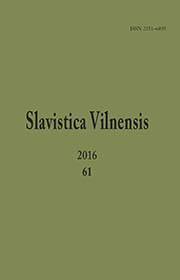Незамеченные семантические полонизмы в приказном языке Московского государства
Unnoticed Semantic Polonisms in the Chancery language of the Muscovite State
Author(s): Liudmila Pavlovna GarbulSubject(s): Semantics, Historical Linguistics, Western Slavic Languages, Eastern Slavic Languages, Baltic Languages, 16th Century, 17th Century, Philology
Published by: Vilniaus Universiteto Leidykla
Keywords: semantic loan words/calques; semantic Polonisms; diplomatic correspon¬dence; the written language of the Great Duchy of Lithuania (the Chancery language and the prostaja mova);
Summary/Abstract: This article examines the history of the following words found in the 17th c. Musco¬vite State diplomatic correspondence: nasaditi ‘appoint, nominate; invest with author¬ity’, nasaditisja ‘put smb. hostilely, with enmity against smth.; be up in arms (against); threaten, imperil’, nužnyj ‘poor, beggarly, squalid, miserable; meagre, scanty; bad, nasty’, oprava ‘repair(s), repairing; restoration, renewal; improvement’, pobrati ‘take away, be¬reave of; take possession of, seize’, privernuti ‘return, restore, recover’, strašlivyj ‘ter-rible, frightful, horrific’, sumnen’e ‘conscience’, teplica (-y) ‘a locality with hot springs; pl. health resort with hot springs’.The author argues that these words, in the meanings provided above, are probably semantic calques from Polish in the Russian written language of the 16th and 17th centu¬ries, which were borrowed likely through mediation of the written language of the Great Duchy of Lithuania, with the exception of nasaditi.
Journal: Slavistica Vilnensis
- Issue Year: 61/2016
- Issue No: -
- Page Range: 35-62
- Page Count: 28
- Language: Russian

